Rosa, Rose, Mei Gui Hua 玫瑰花Mei Gui Hua (TCM)Ward, Gulab (Unani) Se ba’i me tog སེ་བའི་མེ་ཏོག (Tibet) |

|
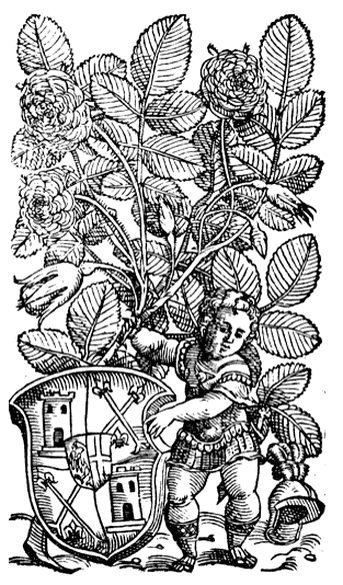
|
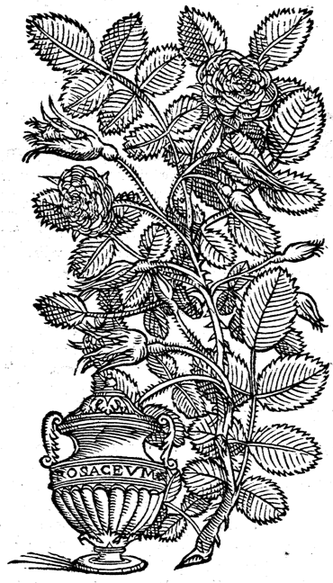
|
|
Della Materia Medicinale Andrea Valuassori, 1562 |
Dioscorides Materia Medica, Mathias, 1563 |
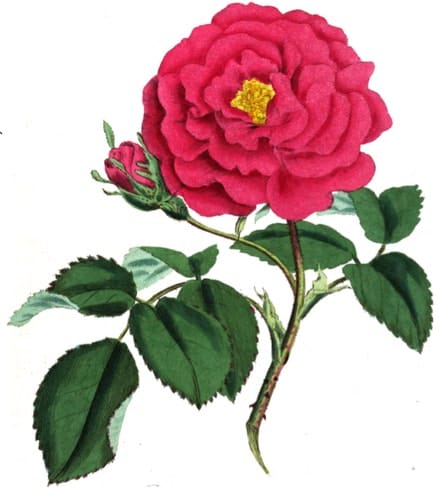 Rosa gallica
Rosa gallicaMedical Botany, Woodville, Hooker, Vol. 3, 1832 |
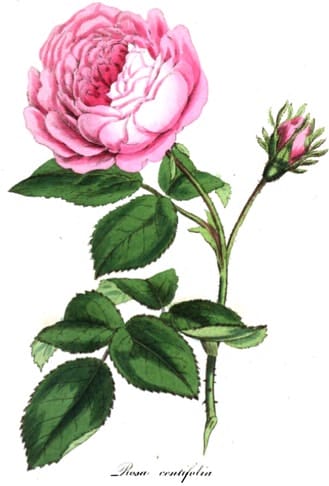 Rosa centfolia
Rosa centfoliaMedical Botany, Woodville, Hooker, Vol. 3, 1832 |
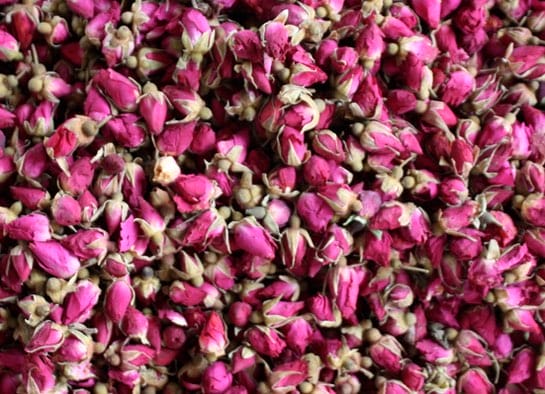 Rose buds used for tea and medicine
Rose buds used for tea and medicine Members CLICK HERE for the PRO VERSION
Members CLICK HERE for the PRO VERSIONBotanical name:
Rose spp. Several species and many varieties are used:
- Gallic or Red Rose: R. gallica;
- Damask Rose: R. damascena;
- Hundred-leaved Rose: R. centifolia
Parts used:
Flower buds; Juice of the flowers
Temperature & Taste:
Mildly Cool and Dry. Pungent, Sweet, Aromatic
Classifications:
2A APERIENT. 2H. CARMINATIVE. 2N. REPELLENTS. 2O. ASTRINGENT. 2P. HEMOSTATIC. 2S. STRENGTHENING. 2T. GLUTINATE
2Z. CICATRIZING
3B. FEBRIFUGE & ANTIPYRETIC. 3D. CORDIALS & CARDIACS. 3L. ANTI-TUSSIVE
4a. CEPHALIC. 4c. CARDIAC. 4d. PECTORAL. 4e. STOMACHIC. 4g. HEPATIC. 4i. UTERINE. 4j. NERVINE. 4k. ARTHRITIC
Uses:
1. Benefits the Heart, Liver, Stomach and Spleen:
-benefits and regulate the Heart, Liver, Spleen and Stomach
-used when heat, damp or Qi stagnation affects any of these organs
-particularly good to support the Stomach; clears Damp, promotes Appetite and regulates digestion
-“Both the flowers and their juice are useful in the ‘wetness’ of the stomach” (Avicenna)
2. Astringes to Stop Leakage:
-binding; used for all types of Fluxes (red is strongest, then the White)
-some said the Red was best for Uterine Bleeding, and the White was best for Leukorrhea.
-excess sweating
3. Clears Heat, Calms the Mind and Settles the Spirit:
-Fever, and Thirst in Fevers
-Palpitations
-Anxiety, Depression, Irritability, Insomnia and Post-natal depression
-traditionally used for Melancholy
-traditionally regarded as increasing calmness, compassion and opening the Heart to love
4. Clears Heat, Stops Bleeding:
–Leukorrhea, Uterine Bleeding, Spermatorrhea, as well as Diarrhea and Dysentery.
-Spitting of Blood.
5. Clears Liver Heat, Eases the Liver, removes Constraint:
-headache, and pains in the eyes, ears, throat and gums
-Liver diseases, abscesses, and blood diseases (Li Shi Chen)
-menstrual irregularities, irritability and anger associated with Liver heat, or Qi stagnation
6. Regulates the Blood and Menstruation, Benefits Reproduction:
-delayed or irregular menstruation and menstrual pain from constrained Qi, or mild blood stasis.
-regulates menstruation, promotes regular ovulation; also Frigidity.
-Dysmenorrhea, Metrorrhagia
7. Damask Roses are gently laxative:
-Pale or Damask Roses loosen the belly
-Avicenna said 35 grams of fresh Red Rose is laxative
-juice of the Flowers purges Choler, Phlegm and Water.
8. Externally:
-“Application of a plaster prepared from a decoction of powdered flowers without squeezing, dissolves hot inflammations and proves useful in erysipelas” (Avicenna)
-externally for Vomiting and Stomachache (over the Stomach), Pain of the Abdomen (topically)
-Headache (forehead and temples), Earache
-sore Gums, Ulcers and Inflammations of the Mouth and Gums, Jaws and Eyes (often boiled in Wine, or Rose water may be used)
-“useful for treating ulcers. It promotes granulation in chronic ulcers” (Avicenna)
-the yellow anthera from the center of the Flowers was used in Dentrifices to tighten and strengthen the Teeth and Gums
-used in Baths or washes for foul smelling perspiration (Avicenna)
-“useful in conjunctivitis” (Avicenna)
-“An enema with its decoction is useful in cases of intestinal ulcers” (Avicenna)
Dose:
Powder: 500mg–3 grams
Brief Decoction or Infusion: 3–6 grams
Correctives:
… available in PRO version
Substitutes:
… available in PRO version

Main Combinations:
Aloe & Rose
Rose, Sandalwood & Licorice
1. To purge Choler (Bile) and Melancholy, Rose with … available in PRO version
2. Stomach weakness:
i. Rose with … available in PRO version
ii. Rose with … available in PRO version
iii. Rose with … available in PRO version
3. Abdominal pain, Indigestion, chronic Fever:
i. Rose with … available in PRO version
4. To clear Heat and Bile:
i. Rose with … available in PRO version
ii. Rose with … available in PRO version
5. Liver Heat and obstruction:
i. Rose with … available in PRO version
6. To strengthen the Heart:
i. Rose with … available in PRO version
ii. Rose with … available in PRO version
iii. Rose with … available in PRO version
7. Melancholy and Stomach weakness, Rose with … available in PRO version
8. Amenorrhea, Dysmenorrhea, Uterine Pain, Rose with … available in PRO version
9. Excessive Menstruation, Rose with … available in PRO version
10. A water to benefit the sight and clear Heat of the Eyes, Rose … available in PRO version
Major Formulas:
Syrup of Rose Solutive (Syrupus Rosaceus Solutivus)
Aromatic Rose Compound (Aromaticum Rosatum)
Abbots Confect of Rose (Diarrhodon Abbatis) (Nicholas)
New Rose Powder (Rosata Novella) (Nicolas)
Troches of Rose (Rhasis)
Troches of Rose (Trochisci Diarrhodon) (Nicholas)
Troches of Rose (Trochisci Diarrhodon) (Mesue)
Troches of Rose Lesser (Mesue)
Troches of Rose Greater (Mesue)
Troches of Rose and Agrimony (Mesue)
Electuary of Rose (Unani)
Electuary of the Juice of Roses (Mesue)
Stomach Pills (Mesue)
Powder to Strengthen the Heart (Wirtzung)
Powder for Excessive Menstrual Bleeding (Wirtzung)
Cautions:
Generally Safe.
Susceptible people may develop sneezing, inflammation of the eyes, fainting, hysteria and even miscarriage (Medical Botany, Woodville, Hooker, Vol. 3, 1832). However, it is generally very safe and well tolerated, and such reactions are probably due to large doses of Rose concentrates (such as the Oil).
Main Preparations used:
Vinegar of Red Roses, Distilled Waters of Red, Damask and White Roses, Conserves of the Red and Damask Flowers Sugar of Roses (made of the juice and sugar), Distilled Oil, Tincture, Infused Oil (Simple and Compound), Manus Christi with and without Pearl, Aloes Rosata, Ointment of Roses
